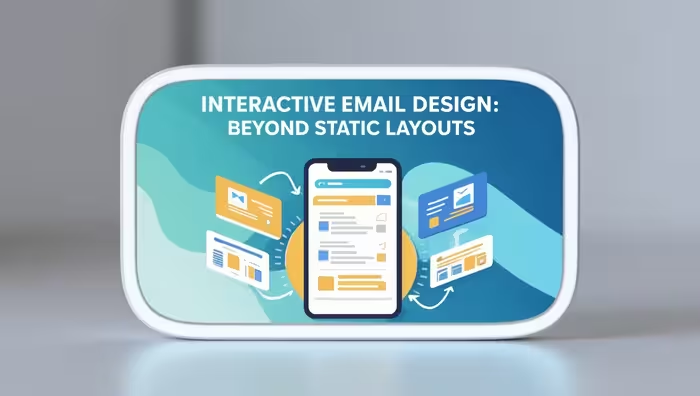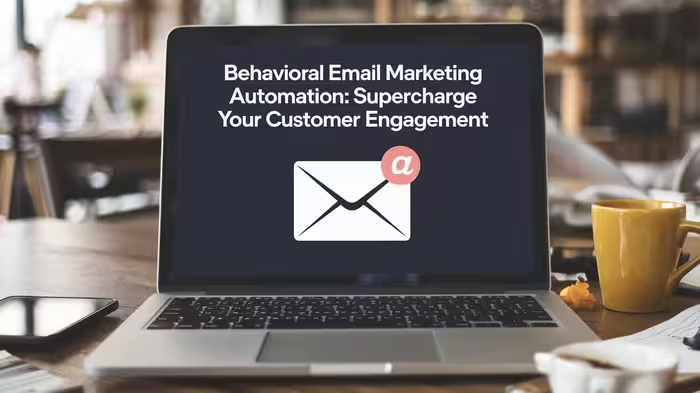Remember the days when emails were just bland text on a screen? Well, those days are long gone, my friend! We’re now in the era of interactive email design, where your inbox is no longer a static collection of messages but a dynamic, engaging experience.
But what exactly is interactive email design, and how can it revolutionize your email marketing strategy? Buckle up, because we’re about to dive into the exciting world of emails that do more than just sit pretty in your inbox!
The Evolution of Email Design
From Plain Text to HTML
Let’s take a trip down memory lane, shall we? Email design has come a long way since the early days of the internet. Remember when emails were nothing more than plain text? It was like trying to make a fashion statement in a world where everyone wore the same grey jumpsuit. Functional? Sure. Exciting? Not so much.
The Rise of Responsive Design
Then came HTML emails, bringing color, images, and layout to our inboxes. It was like someone finally invented fashion! But we quickly realized that one size doesn’t fit all, especially when people started reading emails on their phones.
Enter responsive design – emails that adapted to different screen sizes. It was like having a chameleon in your inbox, changing its appearance to fit wherever it found itself.
Enter Interactive Emails
But why stop there? If emails could change their appearance, why couldn’t they change their behavior too? That’s where interactive emails come in. It’s like your email suddenly grew arms and legs and started doing a little dance in your inbox!
Understanding Interactive Email Design
What Makes an Email Interactive?
So, what exactly is an interactive email? Well, it’s an email that allows recipients to take actions directly within the email itself, without having to click through to a website. Think of it as a mini-website right in your inbox. You can click, swipe, play, and even shop – all without leaving your email client.
Benefits of Interactive Emails
The benefits? Oh, where do I start! Interactive emails can significantly boost engagement rates. They’re like the difference between watching a movie and being in one. They can provide a more immersive brand experience, make your message more memorable, and even streamline the customer journey. It’s like turning your email from a signpost into a destination in itself.
Challenges in Implementation
But let’s not get ahead of ourselves. Creating interactive emails isn’t all sunshine and rainbows. There are technical challenges to overcome, like email client compatibility (I’m looking at you, Outlook!) and the need for fallback options.
It’s a bit like trying to perform a magic trick – you need to make sure it works for everyone, even if they’re watching from different angles.
Key Elements of Interactive Email Design
Clickable Hotspots
Clickable hotspots are like hidden treasures in your email. They allow users to reveal more information or trigger actions by clicking on specific areas of an image. It’s like turning your email into a treasure map – X marks the spot!
Rollover Effects
Rollover effects add a layer of surprise and delight to your emails. When users hover over an element, it changes or reveals new information. It’s like having a secret compartment in your email that only opens when you know where to look.
Accordion Features
Accordion features let you pack a lot of content into a small space. Users can expand sections they’re interested in and collapse others. It’s like having a suitcase that’s bigger on the inside – very Doctor Who!
Carousels and Sliders
Image Carousels
Image carousels allow users to browse through multiple images without scrolling. It’s like flipping through a photo album, but way cooler.
Product Sliders
Product sliders are great for showcasing multiple products in a limited space. It’s like having a conveyor belt of goodies right in your email!
Advanced Interactive Features
Gamification in Emails
Who says emails can’t be fun? Gamification elements can turn your email into a mini-game. It’s like hiding a playground in your inbox – your recipients won’t be able to resist playing!
Live Content Updates
Live content updates keep your email fresh long after it’s been sent. Think live countdown timers, weather updates, or even live social media feeds. It’s like your email is a living, breathing entity that stays current no matter when it’s opened.
Interactive Forms Within Emails
Imagine being able to fill out a survey or RSVP to an event without leaving your inbox. That’s what interactive forms in emails allow. It’s like bringing the mountain to Mohammed – why make your recipients go to a website when the website can come to them?
Design Principles for Interactive Emails
Maintaining Simplicity
Just because you can add all the bells and whistles doesn’t mean you should. Keep it simple and focused. It’s like cooking – sometimes the best dishes are the ones with the fewest ingredients.
Ensuring Accessibility
Don’t forget about accessibility! Your interactive elements should be usable by everyone, including those using screen readers or keyboard navigation. It’s like building a playground – you want everyone to be able to enjoy it, regardless of their abilities.
Optimizing for Mobile
With more than half of emails being opened on mobile devices, mobile optimization is crucial. Your interactive elements should work just as smoothly on a smartphone as they do on a desktop. It’s like being a good dancer – you need to be light on your feet and able to adapt to any dance floor!
Technical Considerations
Email Client Compatibility
Not all email clients support interactive elements. It’s like trying to play a video game on an old console – sometimes, it just won’t work. Always check which clients support your interactive elements and have a fallback plan for those that don’t.
Fallback Options for Non-Supporting Clients
Speaking of fallbacks, always have a Plan B. Your email should still look good and function well, even if the interactive elements don’t work. It’s like being a boy scout – always be prepared!
Performance and Load Times
Interactive elements can increase the size and load time of your email. Keep an eye on this – you don’t want your email to take longer to load than it takes to read! It’s like a joke – if it takes too long to get to the punchline, you’ve lost your audience.
Measuring the Success of Interactive Emails
Key Metrics to Track
When it comes to interactive emails, you’ll want to track more than just open rates and click-through rates. Look at engagement time, interaction rates with specific elements, and how these interactions correlate with conversions. It’s like being a detective – you need to look for clues in unexpected places!
A/B Testing Interactive Elements
Don’t assume that just because something is interactive, it’s automatically better. A/B test your interactive elements against static versions to see what truly resonates with your audience. It’s like being a scientist – always test your hypotheses!
Best Practices for Interactive Email Design
Relevance to Your Audience
Make sure your interactive elements serve a purpose and are relevant to your audience. Don’t add interactivity just for the sake of it. It’s like seasoning a dish – use it to enhance the flavor, not overpower it.
Balancing Interactivity with Content
Remember, the star of the show is still your message. Use interactive elements to support and enhance your content, not distract from it. It’s like being a good host at a party – your job is to facilitate conversation, not dominate it.
Testing Across Devices and Clients
Test, test, and test again across different devices and email clients. What works beautifully in Gmail on Chrome might fall apart in Outlook on Internet Explorer. It’s like being a traveler – you need to be prepared for different climates and cultures!
The Future of Interactive Email Design
The future of interactive email design is exciting and full of possibilities. We’re likely to see more integration with AI, augmented reality elements, and even more sophisticated personalization. Who knows, maybe one day we’ll be able to have a full VR experience right in our inbox!
Tools and Resources for Creating Interactive Emails
There are many tools out there to help you create interactive emails, from email marketing platforms with built-in interactive elements to standalone tools for creating specific interactive features. Some popular options include Stripo, Mailchimp, and Adobe Campaign. It’s like having a well-stocked toolbox – choose the right tool for the job at hand.
Conclusion
Interactive email design is more than just a trend – it’s a powerful way to engage your audience, deliver more value, and stand out in increasingly crowded inboxes. By understanding the principles, overcoming the challenges, and leveraging the right tools, you can create email experiences that don’t just communicate with your audience, but truly connect with them.
Remember, the goal of interactive email design isn’t to show off how tech-savvy you are. It’s about creating more engaging, useful, and delightful experiences for your recipients. So go forth and make those inboxes come alive!
FAQs
- Q: Do all email clients support interactive elements?
A: No, support varies widely between email clients. Generally, Apple Mail, Gmail, and Outlook.com have good support for interactive elements, while desktop Outlook versions have limited support. Always have a fallback option for clients that don’t support interactivity. - Q: Will interactive elements increase the likelihood of my emails being marked as spam?
A: Not necessarily, but it’s important to follow best practices. Ensure your interactive elements don’t obscure important information, include alt text for images, and maintain a good text-to-image ratio. As always, make sure your email list is opted-in and engaged. - Q: How can I measure the ROI of implementing interactive email design?
A: Track metrics like engagement time, interaction rates with specific elements, and how these interactions correlate with conversions. Compare these to your standard email metrics like open rates and click-through rates. Also consider qualitative feedback from your audience. - Q: Are interactive emails accessible for users with disabilities?
A: They can be, but it requires careful design. Ensure all interactive elements are keyboard accessible, include descriptive alt text, and maintain sufficient color contrast. Test your emails with screen readers and other assistive technologies.


